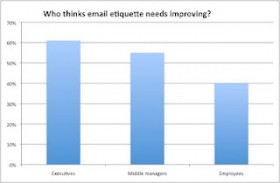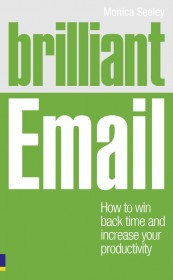How the shape of the earth dictates email’s longevity
Nathan Zeldes, Nov. 4, 2012
Email was invented in 1971, with a message crossing from one end of a room to the other via ARPANET, and has gone on to become a major presence in the life of every knowledge worker on the planet. We devote to it 20 hours a week, complaining endlessly about the overload and the stress. And yet – despite the availability of many more modern tools like IM and various Social Media, email is still here, based on the same paradigm it had 41 years ago. In fact, when Google introduced Wave, that exuberantly media-rich social messaging platform, they said it’s time to reinvent email to match the 21st century; but Wave has since followed the dodo and email is still here.
I’d like to suggest one reason for this seeming paradox – an attribute of email that is mostly absent in the tools seeking to replace it, and which represents a deep advantage for many users.
This relates to the fact that the earth is still (with all due respect to Thomas Friedman) round. In a globalized economy, this means that some of the people you must communicate with will be asleep when you have something to tell them or ask of them. And there’s more – cultural diversity ensures that holidays and weekends vary widely, so much so that Prof. Erran Carmel of American University has found that only about a quarter of the workdays in a year are common to all the countries where a large corporation may run its business. In this messy reality, email shines for its primary attribute: it is asynchronous. It is a messaging platform where messages arrive, accumulate, and persist until read. No matter whether your recipient is asleep, celebrating a local holiday, or on vacation, they’ll get your message when they return to their work.
I remember this aspect well from the eighties, when I was first exposed to email. Working in Israel for an American company, email allowed me to correspond with my US coworkers with a “guaranteed next day response”. The guarantee has since evaporated, alas, due to email overload, but the basic concept has remained: you send the mail out in your daytime, when the other fellow’s asleep, and you get a reply when you’re awake some other day. For global distributed teams, email solves one major issue caused by our spherical home world – it empowers members to work together without staying awake at all hours. Like the Fax machine, its extreme usefulness is keeping it alive.
True, Gen Y and Gen Z folks have different habits than their elders, and they bring with them from school a preference for Facebook and SMS as primary communication channels; but then, their life as students requires no participation in hectic global teams. I suspect that once they enter the enterprise they will retain Facebook as a social tool and even use it to good advantage for some work activity, but will stick to email for most of their globally oriented team interaction.
The challenge for us who combat Information Overload is therefore to help organizations and individuals use introduce some email best practice strategies to allow us to manage email in better, more effective, less stressing ways; because – unless someone finally invents a planet-flattener of some sort – email rules, it isn’t going away anytime soon!
Nathan Zeldes, 12 November 2012
Tags: email best practice, email etiquette rules, email overload, email response times. Nathan Zeldes, information overload
Today’s interview with Geoff Carter is on email etiquette – key dos and don’ts to protect your e-dress code (and especially in the light of the recent Barclays ‘Hey Dude’ emails).
Some useful links are:
Email etiquette goes a long way
 Lessons in email etiquette
Lessons in email etiquette
Seductive email needs discipline
Email etiquette checklist
So you think you deleted the email
Could your business benefit from some email best practice training? If so please contact us about our Brilliant Email Master Classes. These have been proven to help people save up to one hour a day and reduce the risk of you and your company starring in the next email media disaster.
Tags: corporate email etiquette, email etiquette dos and don'ts, email etiquette rules, email etiquette training
When will everyone understand that email and social media communications never disappear into the ether? And why don’t we realise that our emails provide an instant and probably permanent picture of us, our culture and our business office? Good email etiquette is as vital as managing the risk of a breach of security and compliance as discussed recently on the BBC Today programme.
Today, even if we delete an incriminating email or one we’d rather forget – it will still be sitting on some server somewhere or in a ‘cloud’ waiting to rain down disaster at any time up to decades later.
This is particularly the case if your company is linked to the financial, legal, public or professional services world. We all have to keep records for a minimum of six years and in regulated environments like finance and commerce, communications are often retained for ….ever and can be requested as evidence.
Sadly, history keeps repeating itself as I’ve been writing for over a decade about extremely avoidable ‘emailgate’ type disasters. From ‘Govegate’, to Microsoft antitrust, Merrill Lynch, Norwich Union (in 1977), BP emails revealing lying about the oil leakage and putting cost cutting before safety, to the recent memorable and revealing emails and texts exchanged by executives, editors, MPs and even prime ministers called to appear at the Leveson inquiry into phone hacking at the News of the World. But top of the mind is Barclays, the latest large corporate brought down by inappropriate use of email.
 |
“Dude, I owe you big time! Come over one day after work and I’m opening a bottle of Bollinger,” was seductive and highly conversational. Not really the terms and phrases you’d expect for something so important and highly sensitive as fixing the interbank lending rates. Indeed Traders made their requests in person, via email and through electronic “chats” over an instant messaging system with little concern about the content, tone or image they were leaving behind.
And that’s the point. Neither they or their organisation probably ever considered that their words would or could be broadcast worldwide several years after they were written. Even if they had deleted the communications they would still exist somewhere and could be retrieved. The damage caused by casual communication is not just to the image of the individuals involved but can take years and large amounts of funds to rebuild the confidence of customers and the markets in which they operate.
What Barclays did was wrong. Poor use of email and email etiquette just made the evidence easier to find. Perhaps it’s time for ‘slow email’ and more guidance on how email is used in the decision making process?
Tags: corporate email etiquette, email best practice, email etiquette dos and don'ts, email etiquette rules, email etiquette training
Last week it was the CBI report on the need to improve basic literacy skills which prompted my blog on the dire state of email etiquette. Simultaneously there was the excellent report ‘e-nough alre@dy from Grossman Group a leading American communications consultancy. It found that whilst email is perceived as a very effective communications tool many felt email communications needed improving. In particular email etiquette needed attention. The break down is shown below.

They key issues relating to email etiquette being:
This looks just like the list of challenges which we hear when running workshops and asking the question ‘what annoys you about email‘.
Are these results surprising when so few people have ever been trained to use email properly? What ever happened to all those workshops on letter writing which many of us who belong to Generation X had to attend?

‘The Debbrets handbook for email etiquette’ – Jerry Stimfig
Whilst many of us were used to writing social letters, once we started work it was off to learn about the principles of writing business letters.
Email has now become the business letter of the 21st century. Yet why are so few organisations reluctant to run email etiquette courses? Those that do are often shutting the stable door after the horse has bolted: their organisation has become part of the latest media disaster or emails are being used as evidence in court. Poor email etiquette can be very costly.
Budgets we know are tight and so at the very least you could provide your staff with a set of sound email etiquette guidelines. These should include:
Please feel free to use the Mesmo Consultancy ‘Email Etiquette Checklist’ posted in an earlier blog. Alternatively we would be more than happy to come and talk about our Brilliant Email Etiquette master classes and how these can help you save time and money.
Tags: corporate email etiquette, email communications, email etiquette dos and don'ts, email etiquette rules